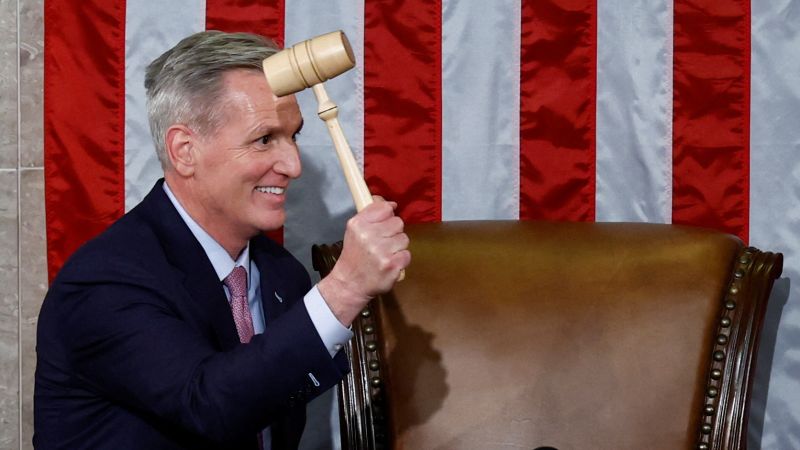

CNN
—
Kevin McCarthy was elected House speaker in the early hours of Saturday morning – a major victory for the California Republican that elevates him to a powerful position leading the GOP majority in the chamber and an outcome that followed days of painstaking negotiations and failed votes.
To secure the gavel, McCarthy had to chip away at opposition from a bloc of hardline conservatives in what became the longest contest in 164 years. To win over critics, McCarthy and his allies made a series of concessions to conservatives – a move that frustrated moderates concerned the concessions may make it harder for the new GOP majority to effectively govern.
As Republicans turn their attention to implementing their agenda, the struggle McCarthy faced to lock down votes may serve as a preview of the kind of challenges he will face in trying to unite his members in the future. The deal-making McCarthy engaged in also appears poised to leave him with a weaker hand to play in his new position of authority, though the California Republican has disputed that notion.
The speaker election unfolded over a series of days – beginning on the first day of the 118th Congress – and highlighted divides between conservatives and moderates. The final hours before McCarthy was elected were punctuated with chaotic and tense moments on the House floor with lawmakers on the edge of their seats waiting to see how a handful of remaining holdouts would vote.
A number of top Republicans expressed confidence that McCarthy could win in the 14th round of voting, but ultimately he fell just short. That outcome threw the House into disarray and prompted Republicans to move to adjourn. At the last moment, however, Republicans switched their votes to be able to instead move to a 15th ballot – and in that round of voting, McCarthy finally won.
In a major shift, McCarthy and his allies successfully flipped more than a dozen GOP votes into his column Friday afternoon – the first sign of serious momentum in support of his speaker bid after a series of failed votes over the course of multiple days.
Here is a list of key concessions and promises McCarthy and his allies have made over the course of the negotiations, based on CNN reporting:
- Any member can call for a motion to vacate the speaker’s chair – this is significant because it would make it much easier than it is currently to trigger what is effectively a no confidence vote in the speaker. Conservatives pushed hard for this, while moderates are worried it will weaken McCarthy’s hand.
- A McCarthy-aligned super PAC agreed to not play in open Republican primaries in safe seats
- The House will hold votes on key conservative bills, including a balanced budget amendment, congressional term limits and border security
- Efforts to raise the nation’s debt ceiling must be paired with spending cuts. This could become a major issue in the future when it is time to raise the debt limit to avoid a catastrophic default because Democrats in the Senate and the White House would likely oppose demands for spending cuts
- Move 12 appropriations bills individually. Instead of passing separate bills to fund government operations, Congress frequently passes a massive year-end spending package known as an “omnibus” that rolls everything into one bill. Conservatives rail against this, arguing that it evades oversight and allows lawmakers to stick in extraneous pet projects.
- More Freedom Caucus representation on committees, including the powerful House Rules Committee
- Cap discretionary spending at fiscal 2022 levels, which would amount to lower levels for defense and domestic programs
- Seventy-two hours to review bills before they come to floor
- Give members the ability to offer more amendments on the House floor
- Create an investigative committee to probe the “weaponization” of the federal government
- Restore the Holman rule, which can be used to reduce the salary of government officials
In pictures: McCarthy elected speaker after historic stalemate
The 14 votes who flipped in favor of McCarthy on the 12th ballot are: Reps. Dan Bishop of North Carolina, Michael Cloud of Texas, Andrew Clyde of Georgia, Byron Donalds of Florida, Mary Miller of Illinois, Ralph Norman of South Carolina, Scott Perry of Pennsylvania, Chip Roy of Texas, Victoria Spartz of Indiana (who had been voting present and had said she would continue to do so until she saw progress), Paul Gosar of Arizona and Reps.-elect Josh Brecheen of Oklahoma, Anna Paulina Luna of Florida, Keith Self of Texas and Andy Ogles of Tennessee.
On the 13th ballot, McCarthy picked up one more supporter: Rep. Andy Harris of Maryland.
On the 12th round of voting, the final tally was 213 for McCarthy, four for Rep. Jim Jordan and three for Rep. Kevin Hern.
In the 13th round, McCarthy had 214 votes and Jordan had six.
The final tally in the 14th round was 216 for McCarthy, two for Biggs, two for Jordan and two voting present.
On the 15th and final round of voting, the tally was was 216 for McCarthy and six voting present.
Part of the strategy to secure McCarthy the speakership was to get some of the holdouts to vote “present,” according to several sources. That was a way to reduce the threshold for winning the speaker race below 218 since the rules say the winner of the race needs to have a majority of those voting for a specific candidate.
Another plan from McCarthy’s allies had been to pick the remaining holdouts off one-by-one to get the speaker votes.
That strategy, according to sources involved, included leaning on former President Donald Trump to help squeeze the holdouts.
This story and headline have been updated with additional developments.
